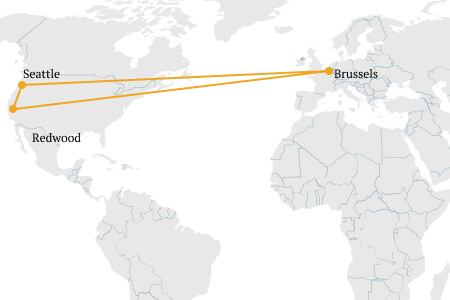Challenge

Flock
Flock, a medium sized entity, with a fledgling web-browser, reached for support in the Microsoft case. Microsoft was using its market presence to tie its web browser, Internet Explorer to its dominant client PC operating system. This led to accusations by the European Commission that it had infringed competition rules. Microsoft reacted by proposing a limit on the access of browsers with a market share higher than 0.5% by means of a ‘ballot screen’. Flock was at risk of being blocked out of the market.
Strategy
 The strategy relied on turning technical and soft law instruments into political messages resonating with the European Commission’s language. It outlined that Microsoft’s solution would have amounted to an oligopoly. In doing so, it demonstrate that, by its very essence the ballot screen proposal was contrary to the European Commission’s goal for open and competitive communications markets. We created a nexus of effective communications and activities that proved to be decisive.
The strategy relied on turning technical and soft law instruments into political messages resonating with the European Commission’s language. It outlined that Microsoft’s solution would have amounted to an oligopoly. In doing so, it demonstrate that, by its very essence the ballot screen proposal was contrary to the European Commission’s goal for open and competitive communications markets. We created a nexus of effective communications and activities that proved to be decisive.
Results
Sophisticated and a pleasure to work with
Shawn Hardin- Chairman & CEO, FLOCK Inc
Alber & Geiger was able to keep its client’s innovative business services available to consumers. Microsoft consequently, had to revise its ‘ballot screen’. Its new proposed ballot screen would allow consumers to choose from a number of 12 suggested web browsers. These included Flock and other alternatives.

 The strategy relied on turning technical and soft law instruments into political messages resonating with the European Commission’s language. It outlined that Microsoft’s solution would have amounted to an oligopoly. In doing so, it demonstrate that, by its very essence the ballot screen proposal was contrary to the European Commission’s goal for open and competitive communications markets. We created a nexus of effective communications and activities that proved to be decisive.
The strategy relied on turning technical and soft law instruments into political messages resonating with the European Commission’s language. It outlined that Microsoft’s solution would have amounted to an oligopoly. In doing so, it demonstrate that, by its very essence the ballot screen proposal was contrary to the European Commission’s goal for open and competitive communications markets. We created a nexus of effective communications and activities that proved to be decisive.